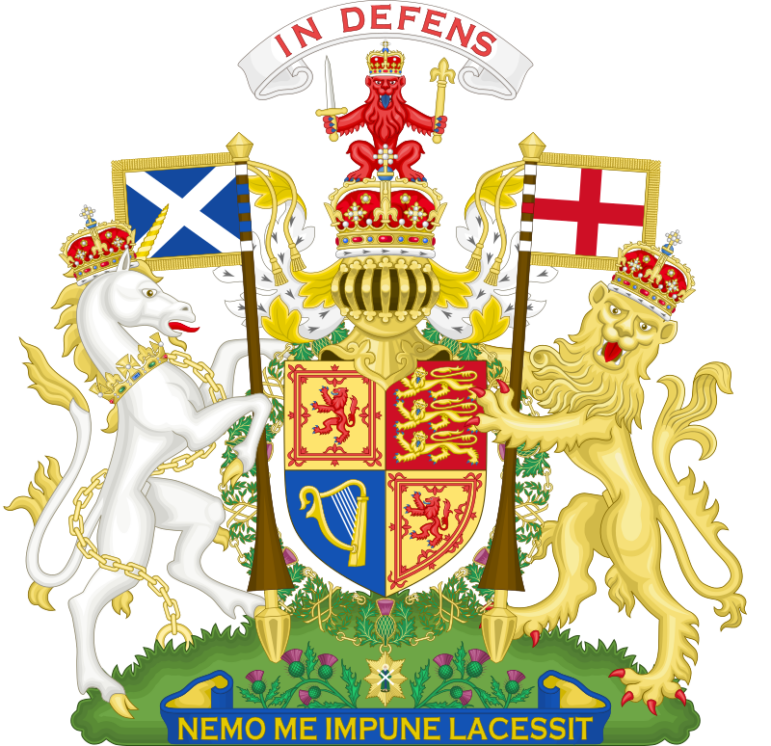LONDON – As we reported two weeks ago, Reverend Linda Haggerstone, the Scottish Pagan Federation’s National Interfaith Officer, made history on Tuesday, January 16, 2024, at 2 PM, as she delivered the Time for Reflection, marking the first Pagan address in the 25-year history of the Holyrood Parliament.
The Time for Reflection is a short session in which members of different faiths are asked to give a 4-minute address to the Parliament with some reflections on their spirituality and the state of the nation. Given the religious demographics of the region, speakers have, historically, been mainly Christian (including Catholics and members of the Church of the Latter Day Saints) but have also included members of other faiths and paths, including Humanists and one Baha’i speaker. Time for Reflection is usually the first item of business at a meeting of the Parliament every week on Tuesday afternoon.

Flag of Scotland
Matt Cormack, Acting Presiding Officer at the Scottish Pagan Federation, told The Herald newspaper that:
“This will be the first time Time for Reflection has been given by a Pagan speaker. It represents the beautiful diversity of Scotland’s population and symbolises the importance of including the voices of people from different backgrounds. For many Pagans this will carry a lot of meaning and a level of recognition from the Scottish Parliament for our beliefs.”
Rev Haggerstone, who describes herself as a Christo-Pagan and who, in terms of her Pagan path, primarily practices Druidry, has a history of pioneering: she’s also the first LGBTQ+ University Chaplain for the University of Glasgow in 2020 and in 2017 organised the first Scottish LGBTQIA+ Interfaith Conference, focused on ‘Exploring spirituality, sexuality and gender.‘ She has also been instrumental in setting up a number of cross-currents between the LGBTQIA+ and interfaith communities, such as the Glasgow LGBT+ Interfaith Network. Steffy VonScott, Presiding Officer of the Scottish Pagan Federation at the time, commented in 2020:
“The Scottish Pagan Federation, as a faith representative Organisation, is currently heading towards its 30th anniversary, and Linda has been an instrumental part in that journey for us in terms of community engagement and our own interfaith ambitions. Given all Linda has done to ensure rights, respect and understanding for not only Paganism, but LGBTQIA+ people of faith here in Scotland, I honestly cannot think of anyone better suited for the role. I am quite sure she will continue to shine and inspire within the University of Glasgow for the foreseeable future.”
This year, Rev Haggerstone has achieved another milestone in her address to Holyrood. Druids might recognise some of her phrasing in Time for Reflection:
“By the power of star and stone, by the power of the land within and without, by all that is fair and free, I welcome you today to this Time for Reflection.”
She told the Parliament that the term ‘Paganism’ has moved from a “slur that still lingers in the world today and is often met with discrimination and scorn” to a “beautifully messy tapestry of spiritual paths. Modern paganism’s greatest benefit, and its biggest challenge, is its diversity in both belief and practice.
Addressing issues such as inclusivity and the nature of different faiths, Rev Haggerstone went on to say that
“I view paganism as a tapestry woven with threads of many different lens, textures and hues. What these diverse threads have in common is generally fourfold – recognition of our interconnectedness with each other, with the earth, and with all existences seen and unseen. The belief that we are here to consciously honour, respect, and care for the Earth – to which we are inextricably connected. Celebration of cycles, for example the seasons, each solstice and equinox, the phases of the moon or life transitions. Valuing creativity, individual accountability, and a balance of masculine and feminine energies.”

Her address included the Druid Prayer, used by many Druid groups as part of a ritual’s conclusion, and a further prayer:
“Deep within the still centre of my being, may I find peace. Silently, within the quiet of the grove, may I share peace. Gently, within the greater circles of humankind, may I radiate peace.”
Scotland has made considerable strides recently, due to the hard work of members of the Pagan community, in seeking legislation which would pardon those accused of witchcraft and executed during the Scottish witch trials (estimated to have been at least 4000 people). Monuments have been created to remember the dead. However, we should note that the Scottish government has now shelved plans for this move, due to its own regulations: Natalie Don, the politician who tried to bring the pardon in via a private members’ bill, was appointed to ministerial status in a reshuffle and ministers cannot promote private members’ bills. Hence Don’s proposed legislation, which garnered predictable objections on social media, has unfortunately been a victim of her promotion and the government says that it has ‘no plans’ to legislate in this area. Previous First Minister Nicola Sturgeon’s apology to those persecuted during the Witch Trials still stands.
More recently, and positively, the Scottish PF has become a member of the Scottish Government’s Faith and Belief Representative Group, attending a multi-faith celebration at Edinburgh Castle in June.
Scotland is still, however, a predominantly Christian nation and there are some lingering prejudices which Pagans in Scotland still face. As recently as last December, SNP Equalities Minister Emma Roddick was mocked for wishing Pagans a Happy Solstice. Comments included “simply absolutely bonkers” and one senior Conservative member asked the Scottish government when Satanists will “receive their message of good wishes.”
Matt Cormack, of the Scottish PF, commented that
“The response from some people to the Minister wishing Pagans a happy Solstice was sadly unsurprising. Many of the comments resonated with the issues and experiences documented in the Pagan Discrimination Survey we conducted in 2020.It highlights that there is still a lot of work to be done around understanding and accepting different faiths.”
Hopefully, despite these setbacks, Rev Haggerstone’s address to Holyrood will be another brick in the rising wall of inclusivity and acceptance of Paganism in Scotland.
The Wild Hunt is not responsible for links to external content.
To join a conversation on this post:
Visit our The Wild Hunt subreddit! Point your favorite browser to https://www.reddit.com/r/The_Wild_Hunt_News/, then click “JOIN”. Make sure to click the bell, too, to be notified of new articles posted to our subreddit.